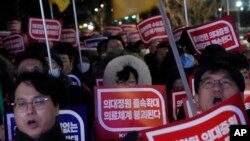Public hospitals in South Korea will extend working hours, the prime minister said on Friday, while expanding use of telemedicine to alleviate growing strain on health care services after a mass walkout by thousands of trainee doctors this week.
Hospitals have turned away patients and canceled surgeries after about two-thirds of the country's young doctors walked off the job to protest a government plan for more admissions to medical schools, prompting fears of further disruption.
"The operation of public medical institutions will be raised to the maximum," Prime Minister Han Duck-soo told a disaster management meeting, saying such hospitals would stay open longer as well as on weekends and holidays to take in the overflow.
As the walkout entered its fourth day, the health ministry said it was allowing all hospitals and clinics to offer telemedicine services, such as consultations and prescriptions, until now available only on a limited basis.
More than 7,800 interns and resident doctors have walked out, the ministry added.
That is just a fraction of the country's 100,000 doctors, but they have a key role in daily operations at teaching hospitals, where they can make up more than 40% of staff, as cost savings make them attractive for larger hospitals.
They perform crucial tasks in emergency rooms, intensive care units and operating rooms at large hospitals that treat patients referred to by smaller hospitals and private clinics.
Nurses warned they were being forced to carry out procedures in wards and operating theatres that are normally the preserve of trainee doctors.
"The primary responsibility of anyone in the medical profession is to care for the patients' health and life," said Tak Young-ran, the president of the Korean Nursing Association, urging the doctors to return to work.
The growing pressure on hospitals spurred the government to raise its health alert to "severe" from "cautious" on Friday, after emergency departments in the biggest hospitals have been squeezed since the protest began on Tuesday.
The protesting doctors say the real issue is pay and working conditions, not the number of physicians.
But the government plan aims to remedy a shortage of as many as 15,000 doctors expected by 2035, among one of the world's fastest-aging populations, where physicians, too, are graying.
Senior doctors and the Korean Medical Association, which represents private practitioners, have stayed out of the walkout but held rallies urging the government to scrap its plan.
Another large rally is expected Sunday in Seoul, the capital.
The prime minister renewed a call to the young doctors not to tarnish by their actions the memory of their sacrifice and dedication during the COVID-19 pandemic that had won them the respect of the public.
He asked those in the medical community to stop "pushing young doctors" and said the government was always open to talks.
Many Koreans support the plan for more medical school admissions, with a recent Gallup Korea poll showing about 76% of respondents in favor, regardless of political affiliation.





